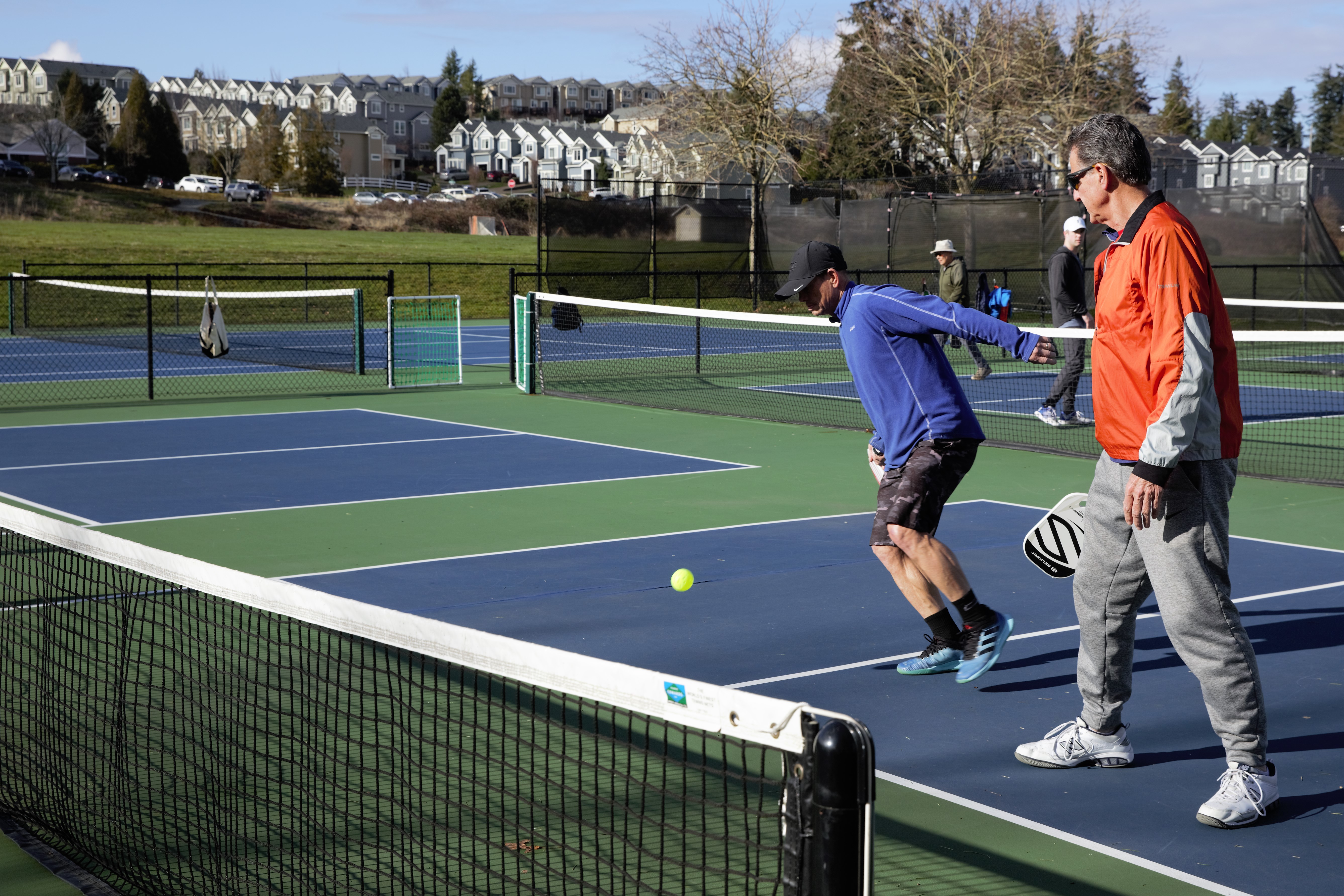
Pickleball sound can travel a substantial distance. Some complaints have come from residents across the park from Tanner Creek courts, as seen on Feb. 10, 2023.
Kristian Foden-Vencil / OPB
On a mid-February Friday afternoon, 16 pickleball players battled it out on four courts at Tanner Creek Park in West Linn. The distinctive pop, pop, pop of the game echoed around the park and into the adjacent neighborhood.
Resident Josh Hull, a graphic designer, said the sound genuinely bothers some people.
“Pickleball really, really hits a nerve. They just can’t put up with it.” he said. “I’m not like that. My wife and I are both like, whatever. But my son … it really bothered him. It’s a constant thing.”
Another neighbor, Dr. Dan Lavery, told a recent meeting of the West Linn City Council that the noise is so bad, it can cause actual physical and emotional distress.
“One of our neighbors lived directly across from the courts and was dying from cancer,” Lavery said. “He noted the pickleball noise was worse than his cancer.”
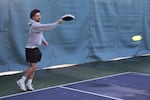
A player pays attention to the pickleball game at hand at the Tanner Creek Park courts on Feb. 10, 2023. The city of West Linn has taken some noise reducing steps, such as hanging this rubber mat around the Tanner Creek pickleball courts.
Kristian Foden-Vencil / OPB
The distinctive pop of the wooden paddle against the plastic wiffle ball is jarring, people say. But it’s the steady onslaught of the sound, hour after hour, that really gets to them.
A few years ago, pickleball simply wasn’t a problem. It was about as popular as tiddlywinks.
Players use a paddle that’s a little larger than a table-tennis paddle to bat a ball across a small net. The ball travels slower than in tennis, and the court is half the size, so it’s easier to play.
The game boomed during the pandemic as families and immunity pods played together. Aging Baby Boomers also flooded into the sport, looking for ways to stay fit and socialize.
Celebrities such as George Clooney and Ellen DeGeneres embraced the game, and sports stars like Naomi Osaka and LeBron James are investing in Major League Pickleball teams.
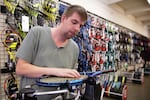
Josh Olson, the general manager of Player's Racquet Shop in Beaverton, looks over a racket on Feb. 10, 2023.
Kristian Foden-Vencil / OPB
Josh Olson, the general manager of Player’s Racquet Shop in Beaverton, said pickleball business has really picked up.
“I would say in the last five years it’s really grown,” he said. “I would say it’s probably a good 35 to 40% of business now. Whereas five years ago it was maybe 10 to 15%.”
When it’s sunny at Tanner Creek, 16 players or more can play from sun up to sun down. The city of West Linn has taken some noise-reducing steps, including hanging a heavy, green rubber mat around the courts’ chain link fence to absorb sound.
Hull thinks the barrier is just an eyesore: “I don’t like it because it looks now like there’s a factory or a warehouse. There’s this wall there.”
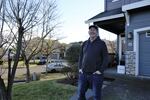
Graphic designer Josh Hull stands outside his West Linn home on Feb. 10, 2023. He lives next door to Tanner Creek pickleball courts. He says the sound genuinely bothers some people.
Kristian Foden-Vencil / OPB
There are some other technical fixes that can reduce pickleball sounds, such as using paddles with rubber coatings. But players say the rubber reduces performance.
On the court, real estate agent Lene Wells said she understands why some homeowners struggle with the tock, tock, tock sound. But she doesn’t think closing courts is the answer.
“When we talk so much about anti-depression, when we talk about anxiety … you have something that genuinely makes people happy,” Wells said.
“We come up here, we get to know people. We’ve had some physical activity. We have found some friends and we have had so much fun.”
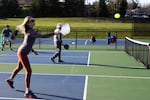
Real estate agent Lene Wells plays a game of pickleball at the Tanner Creek Park courts on Feb. 10, 2023.
Kristian Foden-Vencil / OPB
When OPB visited Tanner Creek, the crowd included a 10-year-old laughing and playing with her mother, a foursome of 30-somethings taking their match seriously and an octogenarian playing her adult children.
Retiree Doug Vokes picked up the game four years ago, after a tennis injury. He thinks people who live near a park should understand the location comes with noise.
“I live about a quarter of a mile from a school. Inside my house I can hear the kids. Should I file a complaint with the city? No,” Vokes said. “Those are happy sounds of young people having fun. Why can’t we have fun?”
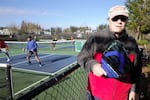
Retiree Doug Vokes holds his pickleball paddle next to a court at Tanner Creek Park in West Linn, Ore., on Feb. 10. 2023.
Kristian Foden-Vencil / OPB
The discussion raging in West Linn has already taken place in Bend and Lake Oswego, both of which closed courts. Towns from California to Florida are dealing with the same issue.
On Feb. 13, three days after OPB went to the park, West Linn leaders decided to close two of the courts at Tanner Creek and to stop using a computer program that schedules matches. They’re trying to discourage organized games. The city will also look at other locations for courts, like inside schools or church basements, or in an industrial area, where sound isn’t an issue.
Council President Mary Baumgardner said it’s frustrating to see neighbors falling out over a game.
“There’s nobody bad or wrong here,” she said. " There’s just a situation that needs to be solved. And so we just need to figure out how to solve it.”
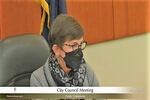
West Linn Council President Mary Baumgardner as seen at the Feb. 13, 2023 meeting.
Kristian Foden-Vencil / OPB
One fix involves putting new courts in Mary S. Young Park, which is large and far from any neighborhoods. But someone pointed out that animals are likely to feel the same way about the sounds of pickleball as humans.
West Linn City Manager John Williams said it will be several weeks before his office can look at all the options for new courts and report back to the council.
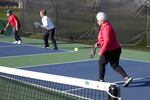
Several people play pickleball on Feb. 10, 2023 at Tanner Creek Park in West Linn, Ore.
Kristian Foden-Vencil / OPB

